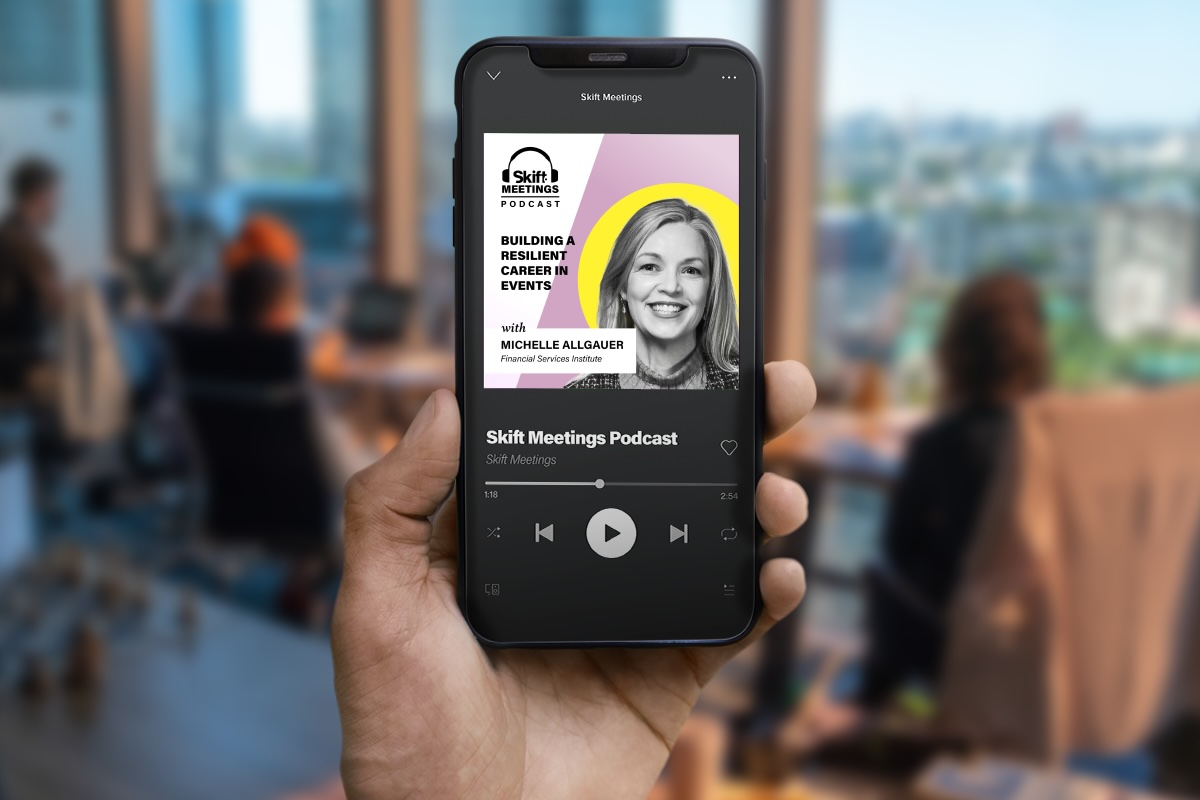Skift Take
Why do so many event planners favor the freelance lifestyle and is it the right choice for you?
In the U.S. around 35% of the workforce are freelance and they contributed over $1 trillion dollars to the economy during 2016 alone. As technology increases and makes communication and flexible-working much easier, freelancing is becoming increasingly popular and accessible. Offering certain benefits and potentially a lot more freedom, more event planners are making the switch and choosing to work for themselves. For others however the lack job security and guarantee of a regular pay packet is a massive issue. Here are 14 reasons to consider and decide whether being a freelance event planner could be right for you.
##abovethefold##
-
Flexibility
The most common reason for event planners to go freelance is the flexibility that it can bring. Ultimately the job is project based so as long as the event gets planned and you provide a good service to the client, within reason you can work whatever hours you want, wherever you want and plan your own schedule. This is particularly beneficial for eventprofs juggling families and allows them to have availability in peak working hours if necessary.
Also, different people are productive at different times, for example some are the most productive before 9am while others would prefer to work later into the night and freelancing caters to this. As a freelancer you are not tied to office hours as you often are if reporting to an employer.
Of course, working during your most productive hours and removing the 9-5 restriction might sound ideal but do keep in mind that you still need to get the clients and the paying work to ensure that you get paid. You also will not get employee benefits such as sick and holiday pay. You are 100% responsible for your own destiny and your own pay cheque if you are a freelance eventprof. This can also make it difficult to switch off and relax.
-
Empowerment
Working for yourself and taking the step to be more independent can be both daunting and exciting. Proving to yourself that you can take on such a large responsibility for carving out your own livelihood, as well as your own progression, can boost confidence and help you to be a better event planner too.
Of course by taking the step to go freelance you need to perform other business roles, such as accounting, contracts, tax, debt collection and admin tasks, too. As a freelance event manager you are essentially a mini business and you won’t have a team of people to look after these other business functions as you may have when working within a large company. Needing to look after administrative and business responsibilities does however take your attention away from your first passion of planning events, however it is very necessary to succeed as a freelancer.
-
Choosing Clients
Working for yourself means you don’t have to work with or for anyone that you don’t want to, and that you can focus on your most profitable clients and work within your chosen niche. Of course money is likely to be the key deciding factor in terms of how choosy you are and you may have to make some allowances but fundamentally you can veto a client or refer them elsewhere if you don’t want to deal with them.
As you make a name for yourself, if you are selective about who you work with and the projects that you take on this is also a great way to build up a personal brand that highlights your exclusivity. This is a longer term strategy but eventually it could mean that you are able to charge more and attract only a top-class clientele if this is your objective.
-
Higher Earning Potential
Your individual overheads are much less than those incurred by a larger business. You may still be able to command similar event management fees and commissions but you have less expenses, which means that you may be able to see more of the earnings going straight into your own pocket. Freelance rates are generally set a little higher to compensate for the often short-term and flexible nature of the projects. In addition to this you can choose to work more hours if you wish, taking on extra projects. Some smaller events may not be viable for larger event management companies but could be worthwhile and profitable for you to manage as an individual event planner. There are also numerous websites, such as Upwork, where freelancers can share their skills and bid for relevant work, hopefully enabling an income to be generated through short term projects during any lean work periods. At the end of the day if you work for someone else they expect to see the benefits, if you work for yourself it is a high risk but potentially high reward strategy as you keep all the profits and chose what to reinvest into growing your business.
-
Fosters Creativity
As a freelance event planner you have the professional and creative freedom to share your own ideas without being restricted by a cautious boss or bureaucratic limitations of a larger firm. This could result in more original and innovative event solutions and new creative partnerships with your vendors, sponsors and other freelancers and stakeholders. If however you thrive on brainstorming and bouncing ideas off colleagues, a freelance role might be unsuitable as it can be a very lonely existence working solo.
-
Diversity of Work
Often in an office environment, if you are recognised for a talent then it is utilized and exploited. The downside to this is that you can end up being given the same clients and similar events to deal with in the future. This can be frustrating if you are looking for new challenges and variety, rather than another unimaginative conference client. Freelance event planners don’t always choose to specialize in a particular niche, many offer a wide variety of skills and services. You can choose to escape the monotony of repetitive work if you so wish by picking and pitching for a wide variety of event contracts, multiple clients or even creating in-house events which match your true passions.
-
Create Your Own Ideals
Going freelance means that you can offer the services you want, in the way you want and be proud of what you put your name to without feeling like you have to compromise your vision and ideals. For example, if the environment and sustainability is something you are passionate about, then you can ensure you work using sustainable processes at all times. If you have certain causes, morals or religious beliefs that you want to adhere to you can because, quite simply, it’s your brand and business. Celebrating your personal ethos can help you to carve out a name for yourself and attract others that respond to similar beliefs.
-
No Dress Code
Some days (here’s looking at you Monday’s) we would all rather lounge in our casual wear all day rather than squeeze into formal business attire and uncomfortable shoes and traipse to work, and that is a luxury that freelance event planners can enjoy. Obviously meeting with clients and face-to-face meetings may still require a professional dress code but day to day work can be done in whatever outfit you feel comfortable and productive in. Even in video calls you can be dressed smartly on the top and casual on the bottom if you so wish!
-
Take The Credit
Often when you are in an event team, some do more than their fair share of the workload but everyone gets the credit and recognition. This is of course the nature of teams but that doesn’t mean it’s always fair. Whether you are in it for the recognition or not, it can be a great feeling to be appreciated and if you are a freelance event manager there can be no doubt with your client where the ideas and dedication came from.
-
Less Commuting, More Travel
As a freelance event planner you can pick your own office or work-from-home, which not only cuts down on wasted commuting time but can also reduces your daily travel expenses. That being said, planning an event for the most part can be done from anywhere, which has its advantages and means that if you want to travel, organise events worldwide or take an extended vacation, all you need is your laptop and smartphone you can potentially make money from any location.
-
Suits Introverts
Yes, introverts can make the best event planners but for them, working in an office or surrounded by people all day, every day can be draining. Of course event planning is a client facing role and event planners constantly deal with many people but becoming freelance helps introverts to avoid having to deal with the “unnecessary” social dynamics and politics of working within a team day-to-day.
-
Security
It used to be that with a company you could have a job for life and get paid whether there is work or not but with today’s economy becoming increasingly uncertain, nothing can be guaranteed. As a freelancer you have control over finding work, knowing exactly what you need to pay the bills and doing what you need to do to go out and get the work. When you have more on the line, you are potentially more motivated to succeed and to see the results for yourself. It could also be easier to foresee any difficult periods ahead.
Job security in the competitive event industry can be difficult but at least as a freelancer you know where you stand and can take steps to secure more business when you need it. Whether that means lowering prices to more get clients at first, diversifying, focusing on opportunities available via freelance sites or working longer hours during difficult periods you can do what it takes to help yourself and be more responsive to quieter periods of work.
-
High Demand
In the event industry, many clients or companies like to work with freelancers, rather than employing someone on their payroll. Working with a freelancer reduces their human resources costs and paperwork and offers many benefits. Many companies do not have the requirement to employ a full- or part-time event planner in house or to commission a large event planning company and the large fees that they command. Instead many small and medium sized event projects are perfectly suited to a freelance event planner.
-
Be Your Own Boss
You call the shots, you make the decisions about what is best for you, your career and your brand as a whole. Fundamentally you decide what you do and don’t take on which is extremely satisfying. For many event planners, this is the ultimate benefit as it gives them full creative and executive control of their events as well as their career and progression. Plus, in the future if they look to expand and create their own firm or business they will oversee others and lead or manage in the way they choose!
In Conclusion
The freelance lifestyle isn’t suited to everyone, particularly if you don’t like to go it alone and be responsible for your own destiny. Being employed has obvious benefits of job security and regular pay, however the positives of being a freelance event planner are wide ranging and particularly suited to pro-active, independent, event planners. Record numbers of event planners are choosing this path and hopefully we have given you plenty to think about if you are considering becoming a freelancer yourself.
Are you a freelance eventprof? What top tips would you share with others considering this path? Please comment below.
Further Recommended Reading and Resources
The Ultimate Guide to Starting an Event Planning Business
The One Thing Every Freelance Eventprof Needs
How to Select the Right Clients
21 Bulletproof Tips to Get More Clients
6 Ways to Find Clients [Video]










